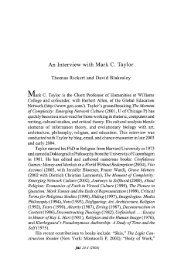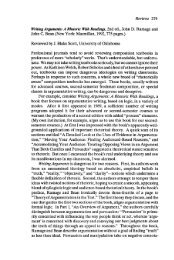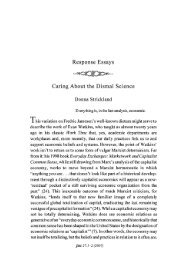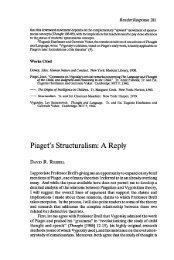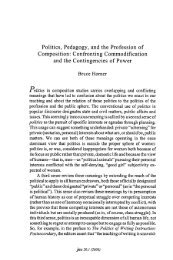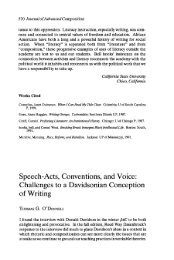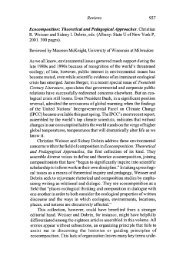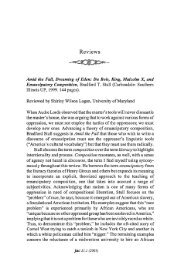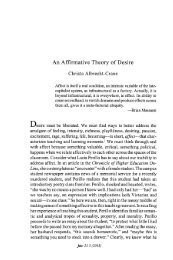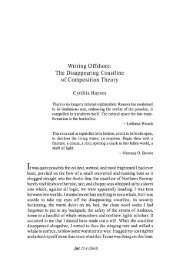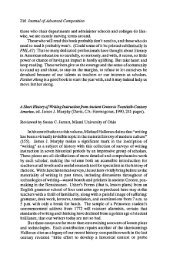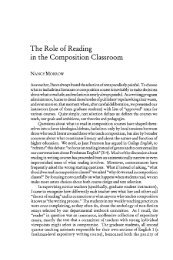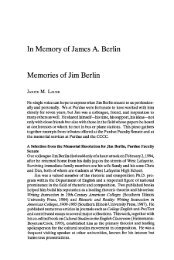Narrative Topic and the Contemporary Science Essay ... - JAC Online
Narrative Topic and the Contemporary Science Essay ... - JAC Online
Narrative Topic and the Contemporary Science Essay ... - JAC Online
You also want an ePaper? Increase the reach of your titles
YUMPU automatically turns print PDFs into web optimized ePapers that Google loves.
118 Journal of Advanced Composition<br />
What was <strong>and</strong> is <strong>the</strong> place of <strong>the</strong> topics in <strong>the</strong>se two very different cultural<br />
conditions, Aristotle's <strong>and</strong> Eiseley's? Aristotle's common <strong>and</strong> special topics<br />
were fashioned to help <strong>the</strong> discourser construct probable arguments for<br />
general audiences. The discourser-intending to persuade ei<strong>the</strong>r a legal,<br />
political, or popular assembly of <strong>the</strong> validity of an enthymeme (not a<br />
syllogism, of course, which was reserved for <strong>the</strong> more philosophical <strong>and</strong><br />
systematic discourse of dialectic )--would move to common topics of degree,<br />
comparison, <strong>and</strong> authority or testimony to support an argument. In what was<br />
still primarily an oral culture, Aristotle needed to convince his students that<br />
oral discourse should be grounded in <strong>the</strong>se <strong>the</strong>n new common topics of<br />
abstract thought. Plato <strong>and</strong> Socrates had established <strong>the</strong> situation in which<br />
abstract reasoning-Socrates' pursuits of definitions of justice, wisdom, <strong>and</strong><br />
<strong>the</strong> ideal state, for example----could hold sway over <strong>the</strong> minds of educated<br />
citizens, even while discourse was delivered orally. Aristotle took <strong>the</strong>se<br />
abstract patterns of thought, made <strong>the</strong>m into common topics, <strong>and</strong> codified<br />
<strong>the</strong>m in a technical or h<strong>and</strong>book rhetoric. The common topics were actually<br />
located in <strong>the</strong> minds of <strong>the</strong> evolving, literate audience, <strong>and</strong> gradually replaced<br />
among <strong>the</strong> educated <strong>the</strong> formulas <strong>and</strong> mythoi of Homeric poetry.<br />
How, <strong>the</strong>n, does this interpretation of <strong>the</strong> conditions existing in Aristotle's<br />
time relate to what I have said earlier about Eiseley <strong>and</strong> <strong>the</strong> narrative topic?<br />
I believe that science essayists such as Eiseley are moving discourse in a<br />
direction opposite to what Aristotle had accomplished in his time. No longer<br />
do educated discoursers need to be reminded of <strong>the</strong> common patterns of<br />
thinking as <strong>the</strong>y write; ra<strong>the</strong>r, in a predominantly literate culture, thinking is<br />
subconsciously controlled <strong>and</strong> organized by established topics. In fact, <strong>the</strong><br />
common topics of Aristotle are in constant friction with <strong>the</strong> more specialized<br />
topics <strong>and</strong> ways of knowing of modem disciplines. The modem identifying<br />
relationship between reader <strong>and</strong> writer is marked by acts of translation in<br />
which <strong>the</strong> special ways of knowing that characterize disciplines are transformed<br />
into <strong>the</strong> educated general reader's intuitive sense of <strong>the</strong> traditional<br />
common topics. The science writer knows that <strong>the</strong> minds of readers contain<br />
<strong>the</strong> inductive <strong>and</strong> deductive paradigms of basic scientific method. But writers<br />
such as Eiseley purposely disappoint those paradigmatic expectations in<br />
readers by going to narrative <strong>and</strong> to story forms to add what he would call <strong>the</strong><br />
element of mystery to an o<strong>the</strong>rwise objective process. But <strong>the</strong>se translations<br />
of ways of knowing must be accomplished without destroying or ignoring <strong>the</strong><br />
systematic ways of knowing codified <strong>and</strong> valorized in <strong>the</strong> scientific community.<br />
Thus, <strong>the</strong> "science essay," as Eiseley calls it, must do double-duty: it<br />
must convince readers that scientific precision <strong>and</strong> logic have been maintained<br />
in <strong>the</strong> inquiry upon which <strong>the</strong> essay is based, <strong>and</strong> it must also move <strong>the</strong><br />
reader, through its literariness, to an acceptance of <strong>the</strong> essential incomprehensibility<br />
of nature.



